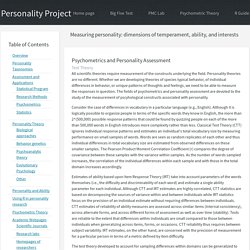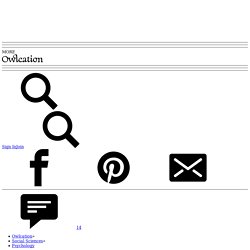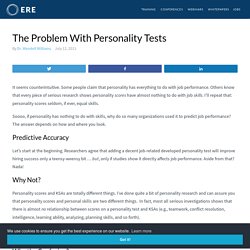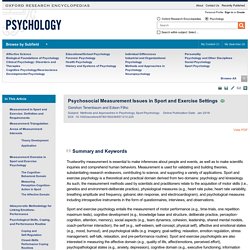

14-3: Learning Approach to Personality. Personality theories. Option B: Psychology of Sport Flashcards by Lucy Gale. The Personality Project: The measurement of personality. Psychometrics and Personality Assessment Test Theory All scientific theories require measurement of the constructs underlying the field.

Personality theories are no different. Whether we are developing theories of species typical behavior, of individual differences in behavior, or unique patterns of thoughts and feelings, we need to be able to measure the responses in question. The fields of psychometrics and personality assessment are devoted to the study of the measurement of pscyhological constructs associated with personality. Consider the case of differences in vocabulary in a particular language (e.g., English). Estimates of ability based upon Item Response Theory (IRT) take into account parameters of the words themselves (i.e., the difficulty and discriminability of each word) and estimate a single ability parameter for each individual.
The test theory developed to account for sampling differences within domains can be generalized to account for differences between domains. Introduction to Albert Bandura's Social Learning Theory - Deconstructed Research Report: Vicarious Reinforcement and Imitative Learning - CloudDeakin. Bandura Social LearningTheory. Social Learning Theory Bandura Social Learning Theory. People learn through observing others’ behavior, attitudes, and outcomes of those behaviors[1].

“Most human behavior is learned observationally through modeling: from observing others, one forms an idea of how new behaviors are performed, and on later occasions this coded information serves as a guide for action.” (Bandura). Social learning theory explains human behavior in terms of continuous reciprocal interaction between cognitive, behavioral, and environmental influences. Necessary conditions for effective modeling Attention — various factors increase or decrease the amount of attention paid. Retention — remembering what you paid attention to. Reproduction — reproducing the image. Motivation — having a good reason to imitate. Reciprocal Determinism Social learning theory has sometimes been called a bridge between behaviorist and cognitive learning theories because it encompasses attention, memory, and motivation. Bandura - Social Learning Theory : simplypsychology.org. Albert Bandura's Social Learning Theory. Learning is a remarkably complex process that is influenced by a wide variety of factors.
As most parents are probably very much aware, observation can play a critical role in determining how and what children learn.1 As the saying goes, kids are very much like sponges, soaking up the experiences they have each and every day. Because learning is so complex, there are many different psychological theories to explain how and why people learn. A psychologist named Albert Bandura proposed a social learning theory which suggests that observation and modeling play a primary role in this process.2 Bandura's theory moves beyond behavioral theories, which suggest that all behaviors are learned through conditioning, and cognitive theories, which take into account psychological influences such as attention and memory.
Volume 90% Press shift question mark to access a list of keyboard shortcuts Play/PauseSPACE Increase Volume↑ SEHS B.1 Individual Differences Flashcards. SEHS B.1.1-B.1.5 by Eryn Hearns on Prezi. Option B – Psychology of Sport : B.1 Individual Differences in Sport. Interactionist Theory. The Interactional Approach in Sport Psychology. Assessing Co-Determinants of Behavior in Sport Over the years, sports psychologists have proposed many approaches to personality.

Initial approaches were often very simplistic, focussing on aspects of either personality traits or states. The Interactional Approach to psychology allows for a degree of interaction between states and traits. This approach seeks to to understand how behavior is influenced by both personality and social learning in the environment. Understanding Psychological Traits and Situational States The Trait Approach Within Psychology analyzes personality based on the assumption that a subject shows a stable set of traits which are consistent across a series of situations and interactions. Using the trait approach, a psychologist has to assume that the general causes of behavior are independent of sporting environment or situations. The downside of such an approach is that it assumes an athlete will act in a particular way, irrespective of the sporting situation. The Problem With Personality Tests.
It seems counterintuitive.

Some people claim that personality has everything to do with job performance. Others know that every piece of serious research shows personality scores have almost nothing to do with job skills. I’ll repeat that: personality scores seldom, if ever, equal skills. Soooo, if personality has nothing to do with skills, why do so many organizations used it to predict job performance? The answer depends on how and where you look. Predictive Accuracy Let’s start at the beginning. Personality assessment - Reliability and validity of assessment methods. Assessing Personality. Measuring Personality Constructs: The Advantages and Disadvantages of Self Reports, Informant Reports and Behavioural Assessments. Methods of personality assessment.
Using psychological tests to enhance skills in sport and performing arts. Effects of personality profiles and profiles of IQ on elite athletes volleyball's performance. Personality assessment - Reliability and validity of assessment methods. The Problem With Personality Tests. Personality Testing in Sports: Should We or Shouldn't We? "If sports teams found that athletes with serious mental disorders, drug problems, or criminal tendencies are a detriment to the team, they may find that using personality testing...can be helpful.
" Personality testing has been used for many decades by industrial/organizational (I/O) psychologists to select appropriate candidates to fill certain job positions. In particular, police departments and fire departments often require personality testing of applicants. Even many seminaries require testing of students desiring to become ministers or priests. More recently, some professional sports teams are using personality testing to help select from the draft choices. Is this a good idea and what kind of problems can we expect in this process? Psychosocial Measurement Issues in Sport and Exercise Settings - Oxford Research Encyclopedia of Psychology. Aldwin, C.

M. (2007). Stress, coping, and development: An integrative approach (2d ed.). New York: Guilford.Find this resource: Anderson, R. D., & Helms, J. Bandura, A. (1997). Personality Testing in Sports: Should We or Shouldn't We?